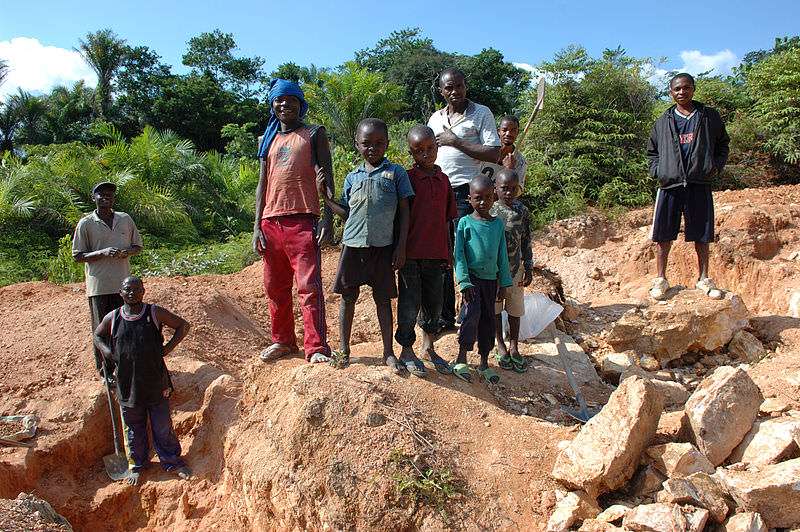How the Dodd-Frank Act Has Caused Poverty and Fuelled War in Africa


A lot has been written about the Dodd-Frank financial reform package passed in the wake of the 2008 economic crisis. There has been much less coverage of an obscure provision in the legislation that is having a detrimental effect on the lives and livelihoods of millions of African miners.
The provision in question (Section 1502) was designed to weaken Congolese militia groups, whose murderous violence has sparked a string of conflicts and caused more deaths than any war since World War II. It set out to do this by requiring U.S. companies to "disclose their use of conflict minerals" in the hope that this would cut off the profits of mines controlled by the militias.
Despite this noble goal, the law—which came to be known by villagers as Obama's Law—quickly backfired. In the four years since it was signed, Dodd-Frank has ruined the livelihood of millions artisanal miners, driving them and their families deeper into poverty. Details of the law's unintended consequences were recently reported in The Washington Post:
In the fall of 2010, two months after the law's signing, Congo's government halted mining for six months — even at facilities not controlled by armed groups. The move had tremendous repercussions in a country where, by some estimates, a sixth of the 70 million inhabitants depend on artisanal mining.
The purpose of this shutdown was to launch a certification process so that the nation's minerals could be classified as conflict-free. However, the implementation of this process has been nothing short of a disaster. Its sheer ineffectiveness was highlighted in the same Washington Post article:
As of June, the government had certified just 25 mining sites out of hundreds in South and North Kivu provinces as "green" — meaning there was no presence of armed groups and there were no children or pregnant women laborers — according to U.N. monitors.
This ordeal has caused a collapse of the mineral industry, forcing many miners to find other ways to survive. For some, this has meant joining up with the very militias the law was designed to target. And what of the broader effect on those militias? It appears to have been, at best, negligible. Many remain in control of mineral mines, while others have responded by diversifying their revenue streams. All continue to destabilize eastern Congo.
From the evidence it is quite clear that Section 1502 of the Dodd-Frank Act has been a failure. It has harmed millions of innocent people and, by increasing militia recruitment, is arguably helping fuel the Congo's bloody civil war.
These outcomes ought to remind politicians and political activists to think long and hard about the potential consequences—both seen and unseen—of legislation. Situations like the one playing out in Congo will continue until people learn to stop reacting to the world's problems with the well-meaning but unhelpful thought that "there ought to be a law."
Free Minds and Free Markets aren't free! Support Reason's annual Webathon with a tax-deductible donation and help change the world in a libertarian direction. For details on giving levels and swag, go here now.
Editor's Note: As of February 29, 2024, commenting privileges on reason.com posts are limited to Reason Plus subscribers. Past commenters are grandfathered in for a temporary period. Subscribe here to preserve your ability to comment. Your Reason Plus subscription also gives you an ad-free version of reason.com, along with full access to the digital edition and archives of Reason magazine. We request that comments be civil and on-topic. We do not moderate or assume any responsibility for comments, which are owned by the readers who post them. Comments do not represent the views of reason.com or Reason Foundation. We reserve the right to delete any comment and ban commenters for any reason at any time. Comments may only be edited within 5 minutes of posting. Report abuses.
Please to post comments


That road to hell paving project sure is coming along nicely. What is it with statists and their inability to consider second order consequences? It's like when they see a factory with what they consider to be atrocious working conditions, and then are shocked that the workers are pissed at them for having to resort to prostitution or subsistence farming to survive after the factory is shutdown.
Look Jordan, the road to hell was a shovel ready project so it naturally received stimulus funding.
Despite this noble goal, the law?which came to be known by villagers as Obama's Law?quickly backfired.
You don't say.
Dodd-Frank has ruined the livelihood of millions artisanal miners,
They could always just move to Williamsburg to set up shop...
Selling artisanal mayonnaise
The provision in question (Section 1502) was designed to weaken Congolese militia groups,
Why should unrelated bullshit shoehorned into a financial reform act be any better thought out than the meat of the act itself?
The Congolese were being exploited before. They're much better off now that evil profits aren't forcing them to mine.
Because without Dodd-Frank, it'd be a paradise.
So, because a lot of bad stuff already goes on there, Dodd-Frank should be blameless for any bad stuff that it causes? That's certainly a Tony-esque argument.
Um, did you even read the article? Without Dodd-Frank, a lot of people would still be working legitimate mining jobs instead of having to join the very militias the act was intended to fight.
You sound like someone who's never lived in Africa.
Obviously Dodd-Frank was idiocy (except the crony-money-shifting part, which is working as intended), but to think it actually made any difference in either direction is dumb too.
Small things add up. Just because it didn't cause all of the problems there, it is preposterous to think it did, doesn't mean it didn't make things worse.
The article makes it clear that it had some marginal impact at the periphery at least.
Sure, the Congo wasn't likely to be anyone's idea of a great place in its absence. The entire point is to point out how, yet again, a regulation placed eerily into a bill with no bearing on the specifics of that situation has the impact of doing exactly the opposite of what its intent presumably was.
Again, that's a Tony-esque argument. But since you think that argument holds weight, you can actually read the article which contains quotes from plenty of people who do live in Africa.
So everyone in this article is wrong because... well just because.
Well, because it's Africa. Just go live there, it'll take you about a month to figure out what I'm talking about.
Dodd-Frank has about the same effect on Africa as Carbon tax laws have on global warming.
You read much ungoodly:
In the fall of 2010, two months after the law's signing, Congo's government halted mining for six months ? even at facilities not controlled by armed groups. The move had tremendous repercussions in a country where, by some estimates, a sixth of the 70 million inhabitants depend on artisanal mining.
The purpose of this shutdown was to launch a certification process so that the nation's minerals could be classified as conflict-free. However, the implementation of this process has been nothing short of a disaster. Its sheer ineffectiveness was highlighted in the same Washington Post article:
As of June, the government had certified just 25 mining sites out of hundreds in South and North Kivu provinces as "green" ? meaning there was no presence of armed groups and there were no children or pregnant women laborers ? according to U.N. monitors.
Yeah, I get all that, it was in the article. I read it. I don't take it as the word of god, because that's not how it works there.
For instance, when the UN shut down the Toe Town rubber refinery in 2012, they said it was shut down. You know what was going on there every single day after the UN inspection that shut it down? They were refining rubber.
I trust reports out of Afghanistan more than I trust reports out of Africa.
Just more argument by assertion.
As opposed by yours from authority.
No, actually that's what you're making. I have evidence in the linked article. You have the fact that you lived in Africa.
If that's "evidence" then more power to you.
Clearly more fabrications. I wonder just how many people they've managed to hoodwink.
Having lived in Africa for a few years, you clearly know better than Kabesha - a lifelong resident - what his own situation is.
I clearly know that it's probably not true.
You can believe it if you want to, I don't, based on my experience.
Here's somebody else suffering from false consciousness:
"You can believe it if you want to, I don't, based on my experience."
I knew someone was raped once. Therefore, the Rolling Stone article is true
/Derp
Re: Counterfly,
Anything looks like paradise compared to Dodd-Frank.
Without Dodd-Frank, it'd certainly cost us less to get the same results.
Do you work in finance?
Different boat but same harbor... Even Paul fucking Krugman recognizes that sweatshops are better than the alternative. The attitude of "if I wouldn't do it, then no one should do it" is one of the most arrogant thought processes to come out of the prog camp - reeking of the exact same elitism they supposedly stand against.
Do they even supposedly<?I stand against elitism anymore? I genuinely don't know. I mean I know that they're not actually anti-elitist, that's obvious, but I'm honestly not sure if that's even one of their tenets any more.
Just like the SJ harpies with racism or whatever is trending this week, they don't explicitly say they're against it. They point their fingers at the speck in everyone else's eye - minor inconveniences - whilst ignoring the plank in theirs. The underlying tone of "we would never do that" in every argument they make is their plank.
I'm not even religious... I just love the speck-plank metaphor. It's applicable to so much.
I only wish they had planks in their eyes.
It's like when they see a factory with what they consider to be atrocious working conditions, and then are shocked that the workers are pissed at them for having to resort to prostitution or subsistence farming to survive after the factory is shutdown.
And they get all pissy when those people turn to cooking meth and moonshine. You cannot please the bastards.
Conflict minerals? I hear Palin's Buttplug is an expert on them!
He understands at least 8% of the law!
That was my claim to fame among H&Rers;. I think Shreek's asshole is still hurting from that one.
BUT LIBERTARIANS ARE TO BLAME FOR IPADS, NOT BAD LAWS WITH GOOD INTENTIONS...
/mtrueman
If memory serves, this is actually the fault of Sam Brownback.
I have now spent over 200 hours dealing with this bullshit for the one pound of tin per year that my company uses.
Dodd-Frank has ruined the livelihood of millions artisanal miners, driving them and their families deeper into poverty.
Something something unintended consequences.
Why does the Obama Administration hate Africans so?
It's like it's being run by the Klan.